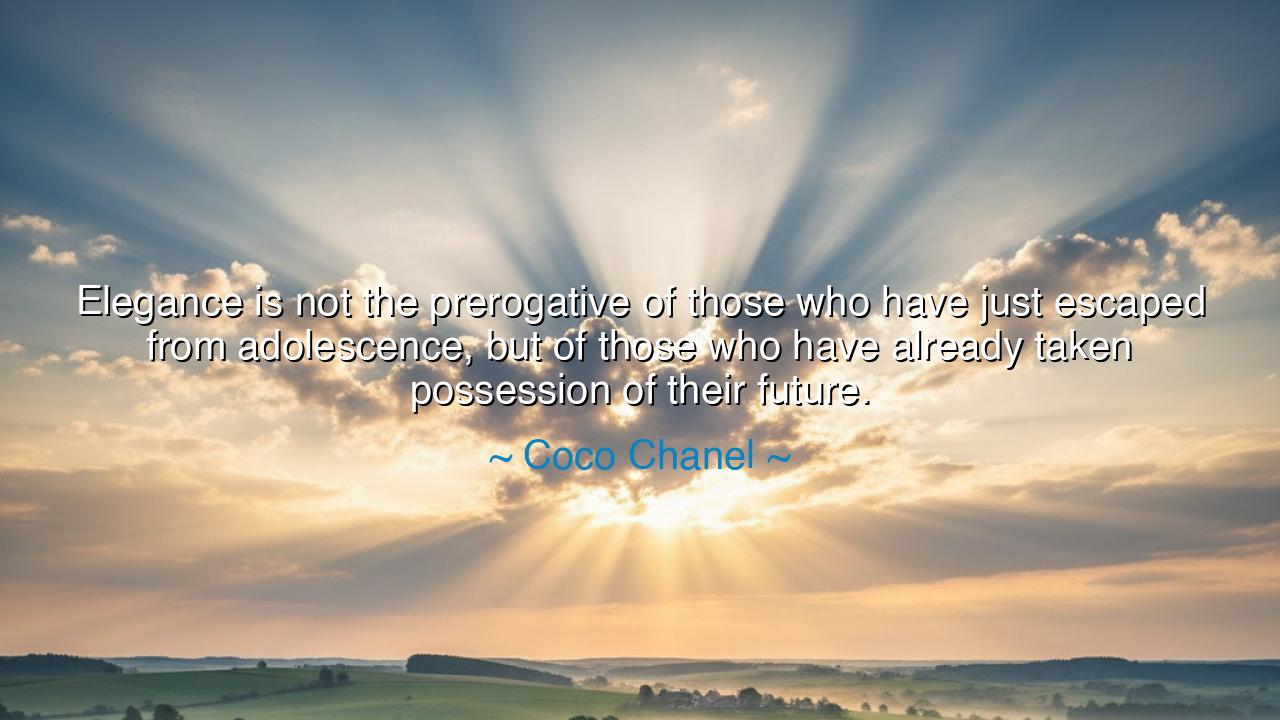
Elegance is not the prerogative of those who have just escaped
Elegance is not the prerogative of those who have just escaped from adolescence, but of those who have already taken possession of their future.






"Elegance is not the prerogative of those who have just escaped from adolescence, but of those who have already taken possession of their future." These words, spoken by the iconic Coco Chanel, hold within them a profound understanding of what true elegance entails. In the ancient world, elegance was not merely about outward appearance, but about the inner qualities that a person cultivated through experience, wisdom, and a deep understanding of themselves. Chanel’s statement suggests that elegance is not something that is simply bestowed upon the youthful or superficial; it is a quality that emerges from within, nurtured by the person who has claimed their future and embraced their destiny.
In the times of ancient Greece, philosophy and virtue were the very pillars of elegance. The Spartan warriors, for instance, though known for their strict discipline and fierce fighting, were also taught the value of self-control and grace. True strength, they believed, was expressed not just in physical prowess, but in the dignity with which one faced the challenges of life. Similarly, the great philosopher Socrates spoke of elegance in a more moral sense, teaching that the most elegant of lives were those lived with virtue—lives where wisdom, self-mastery, and a deep commitment to truth shaped a person's actions, just as the grace of the soul shapes one’s outward appearance. The true essence of elegance, as understood by the ancients, was inner harmony that radiated outward.
Coco Chanel, much like the ancient philosophers, believed that elegance was not something that could be bought, nor something that was dependent on age or social standing. Elegance was a reflection of confidence, purpose, and self-assurance, qualities that emerged only after one had taken control of their life's direction. The youth may exude a certain vibrancy, a raw energy that is attractive and undeniable, but true elegance emerges only when a person embraces their future, when they take full responsibility for the choices they make and the person they are becoming. Chanel herself, having risen from humble beginnings, knew that elegance came from the inner strength that allowed her to carve out her own path in the world, to defy convention, and to shape the very world of fashion according to her vision.
This concept of grace in maturity is echoed in the stories of great leaders throughout history. Cleopatra, the Queen of Egypt, is often seen as a figure of beauty and allure, yet her elegance went far beyond her appearance. It was her intellect, her strategic mind, and her ability to lead a kingdom through treacherous political waters that defined her legacy. She had, through her wisdom and decisiveness, taken possession of her future, and it was this command over her destiny that made her an elegant leader, respected and admired not for fleeting beauty, but for the strength and grace with which she navigated her reign.
Similarly, the legendary queen Elizabeth I of England, often regarded as one of the most elegant monarchs in history, did not rely on the beauty of youth, but on her commanding presence and her uncompromising vision for her country. Elizabeth’s elegance was the product of her education, her strategic thinking, and her unwavering commitment to her people and her nation. Her ability to rise above the challenges of her time, and to hold her own in a world dominated by men, showcased the kind of elegance Chanel spoke of: a graceful maturity earned through the mastery of one’s own fate.
The lesson we draw from Chanel’s words is that elegance is not a mere aesthetic quality; it is a way of being. True elegance emerges when we take full responsibility for our lives and refuse to be defined solely by external appearances or youthful enthusiasm. It is a maturity that is born from experience, self-discovery, and the willingness to embrace the challenges of life with grace. Just as the great leaders of history did not rely on their youth, but rather their wisdom and resilience, so too must we look within ourselves for the strength to define our future and to act with purpose and dignity.
In your own life, ask yourself: have you taken possession of your future? Are you living with a sense of purpose, guided by your own wisdom and vision, rather than simply relying on external validation? The true essence of elegance lies not in what others see, but in how you see yourself and how you navigate your path with confidence and self-assurance. Just as Chanel and the great figures of history demonstrated, elegance is about more than appearances; it is about living with integrity, embracing your unique journey, and creating a future that reflects your inner strength and purpose.






AAdministratorAdministrator
Welcome, honored guests. Please leave a comment, we will respond soon